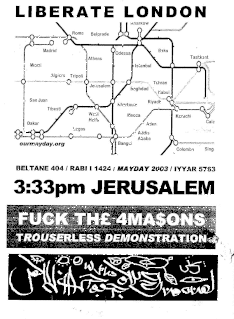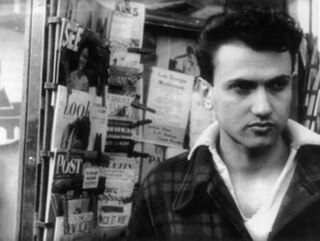Related Research Articles
The Situationist International (SI) was an international organization of social revolutionaries made up of avant-garde artists, intellectuals, and political theorists. It was prominent in Europe from its formation in 1957 to its dissolution in 1972. The intellectual foundations of the Situationist International were derived primarily from libertarian Marxism and the avant-garde art movements of the early 20th century, particularly Dada and Surrealism. Overall, situationist theory represented an attempt to synthesize this diverse field of theoretical disciplines into a modern and comprehensive critique of mid-20th century advanced capitalism.

Psychogeography is the exploration of urban environments that emphasizes interpersonal connections to places and arbitrary routes, and follows a loosely defined urban practice known as the dérive. It was developed by members of the Letterist International and Situationist International, which were revolutionary groups influenced by Marxist and anarchist theory as well as the attitudes and methods of Dadaists and Surrealists. In 1955, Guy Debord defined psychogeography as "the study of the precise laws and specific effects of the geographical environment, consciously organized or not, on the emotions and behavior of individuals." As a practice and theory, psychogeography has influenced a broad set of cultural actors, including artists, activists and academics.

Asger Oluf Jorn was a Danish painter, sculptor, ceramic artist, and author. He was a founding member of the avant-garde movement COBRA and the Situationist International. He was born in Vejrum, in the northwest corner of Jutland, Denmark, and baptized Asger Oluf Jørgensen.

Armando, born Herman Dirk van Dodeweerd, was a Dutch painter, sculptor and writer.

The Society of the Spectacle is a 1967 work of philosophy and Marxist critical theory by Guy Debord, in which the author develops and presents the concept of the Spectacle. The book is considered a seminal text for the Situationist movement. Debord published a follow-up book Comments on the Society of the Spectacle in 1988.

Isidore Isou, born Isidor Goldstein, was a Romanian-born French poet, dramaturge, novelist, film director, economist, and visual artist who lived in the 20th century. He was the founder of Lettrism, an art and literary movement which owed inspiration to Dada and Surrealism.

Villa Massimo, short for Deutsche Akademie Rom Villa Massimo, is a German cultural institution in Rome, established in 1910 and located in the Villa Massimo.

Giuseppe Pinot-Gallizio (1902–1964) was an Italian painter, the formulator of industrial painting, and a founding member of the Situationist International. He was also a scholar of popular culture, archaeology, nomadism, and botany.

Switzerland competed at the 1960 Summer Olympics in Rome, Italy. 149 competitors, 147 men and 2 women, took part in 90 events in 16 sports.
Alice Becker-Ho, also known as Alice Debord, is a Chinese-born French intellectual closely associated with the Situationist International. Among other works, she has written poetry, a scholarly study of slang, and a travel memoir. The widow of Guy Debord, she is best-known for being the editor of his complete letters, which have been published in eight volumes.
The International Society for the History of Philosophy of Science (HOPOS) is a philosophical organization for promoting the study of the history of philosophy of science. The society promotes exchange of ideas among scholars through meetings, journals, and online. It maintains an active email listserv, HOPOS-G.

The Standard is a 1977 war drama film directed by Ottokar Runze and starring Simon Ward, Siegfried Rauch and Peter Cushing. It was made as a co-production between Austria, Spain and West Germany. The film is based on the 1934 novel The Standard by Alexander Lernet-Holenia, previously turned into a 1935 film My Life for Maria Isabella in Nazi Germany. It premiered at the Cannes Film Festival.
The Gutenberg Prize of the City of Leipzig is an award in memory of Johannes Gutenberg. Since 1959, the prize honor personalities or institutions that make outstanding contributions to the promotion of the art of books. Awarded people and Institutions have set standards with their artistic, technical, or scientific achievements, especially in the areas of typography, book illustration, book publishing, and book production.
The Germany men's national artistic gymnastics team represents Germany in FIG international competitions.
References
- 1 2 3 "Situationist International Online". www.cddc.vt.edu.
- 1 2 "Situationist International Online". www.cddc.vt.edu.
- 1 2 "Situationist International Online". www.cddc.vt.edu.
- ↑ "Situationist International Online". www.cddc.vt.edu.